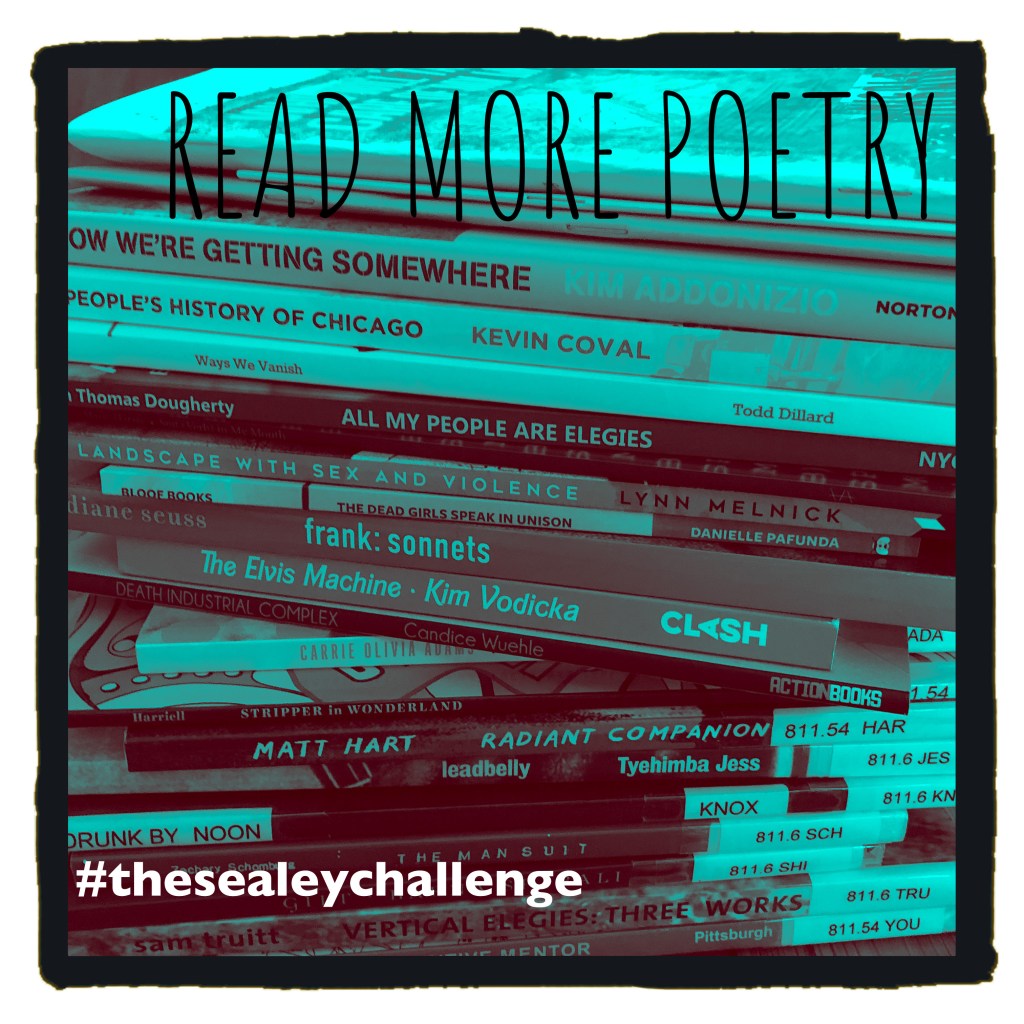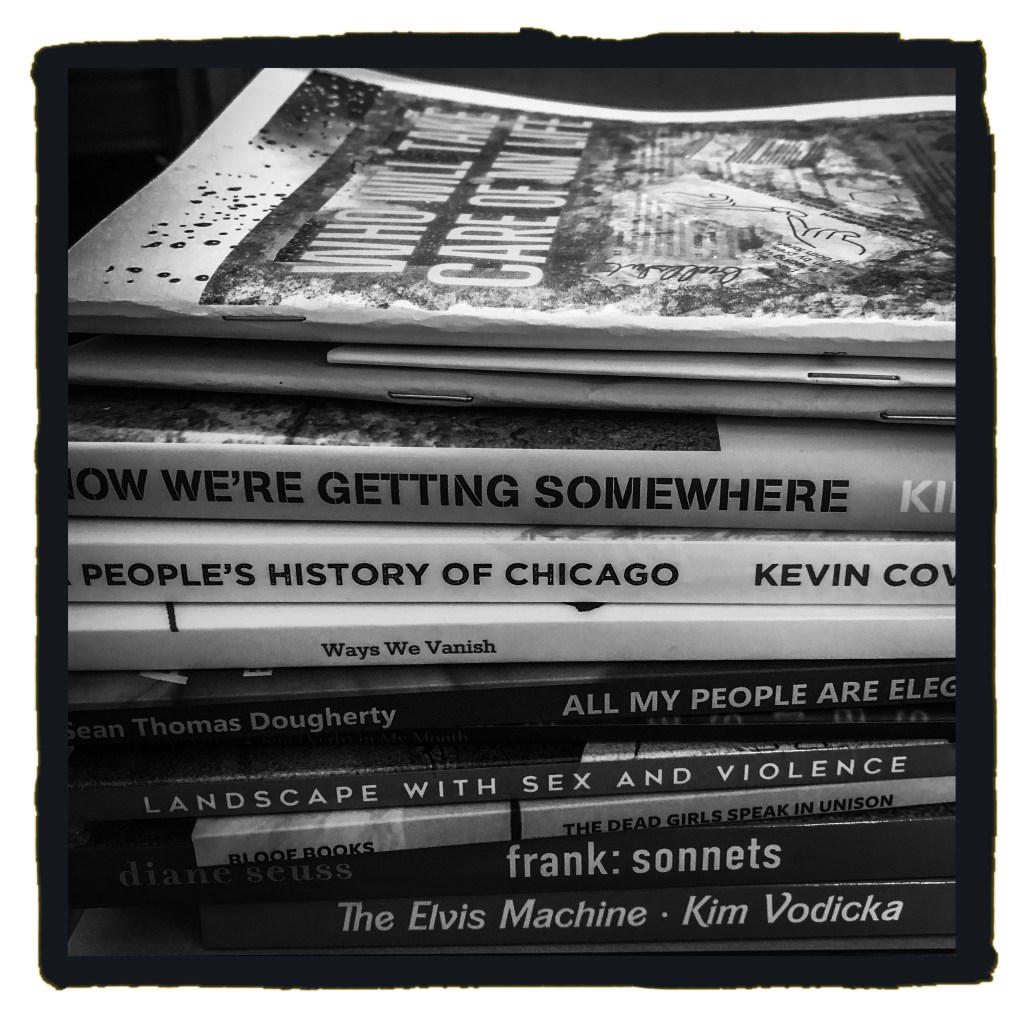by Jessie Lynn McMains

If you follow the same sorts of people on social media as I do, every year in late July, your feeds are flooded with photographs of hulking book-stacks and captions that read something along the lines of: Can’t wait to read these in August! #thesealeychallenge. And if you’re anything like me, come late July, you’re busy assembling your own stack of poetry books for the Sealey Challenge.
What’s the Sealey Challenge? Simple. The challenge is to read one book of poetry every day in August. Poet Nicole Sealey started it in 2017, as a personal challenge for herself, but when she posted about it on social media, others decided to join in. It has grown every year since, and now people across the world attempt to read one book of poetry each day in August. It sounds kinda daunting to think of reading a book every single day for a whole month, so I’ll give you some tips that have worked for me over the years I’ve been participating:
- Choose books of varying lengths, from short chapbooks to long anthologies/collected works. If you think a particular book is too long for you to read in one day, you can do what I do: start it, but read other, shorter things you can easily finish in one day in between reading sections of the longer book. Sometimes it takes me several days to finish a longer book, and then I count it as my book for the day on whatever day I end up finishing it.
- Any format counts. Printed chapbooks and books, obviously, but also ebooks, of course. And audiobooks, too, if that’s your thing.
- Don’t have the time (or inclination) to just sit down and read a book of poetry cover-to-cover? Read in snatches! Read three pages as you drink your coffee in the morning, and five while you eat lunch. Read poems while you pee, read poems on the bus, listen to poems while you clean the house!
- Pick more books than there are days in August. This sounds counter-intuitive, but bear with me. I usually buy a few new books of poetry prior to August 1, select some I already own but haven’t yet read (plus some I already own and want to reread), and then check a bunch out from the library. Between all that, I often end up with something like forty books to choose from. This is a good thing for me, because: sometimes I read the first few poems in a book and just can’t get into it, and this way I can put it aside and start a different one without worrying I’m going to run out of books to read before August ends.
- Don’t beat yourself up if you don’t end up finishing 31 books. So you only finished twenty, or fifteen, or five? So what?! The Sealey Challenge has no prize other than the opportunity to be cracked open by the beauty of words.
Don’t know where to start when choosing what to read? Here are some ideas:
- Read some poets from the canon that you’ve either never read, or have only read a few of their poems. Maybe you still won’t understand what all the hype is about, but at least you’ll have read them for yourself and formed your own opinion. And maybe you’ll wind up with a new favorite poet! This is just to say…when all I knew of William Carlos Williams was that damn red wheelbarrow and those white chickens, I thought I hated his stuff, but then I delved deeper and now I love ol’ WCW.
- Choose a few of your absolute favorite books of poetry, or ones you remember enjoying but haven’t looked at it in a long time, and give them a reread. I personally wouldn’t select too many rereads, because part of what I like about the Sealey Challenge is the opportunity to read a lot of new (to me) poets and/or books. But you should do this your way! If you want to do all rereads, do it!
- Try to choose books with a diverse range of forms and styles. I don’t know about you, but if I were trying to read only sonnets, or only prose poems, or only haikus, or only long-form lyric poems, or…you get the idea—I’d get bored pretty fast. Anthologies are great in this regard, if they are grouped around poets from a specific place or demographic, or a specific theme, rather than a style of poetry.
- Diversify your reading experience in general, pt. 1: Try reading poets writing in a language other than your first/primary language. Either read them in translation, or, if you happen to be able to read the language they are writing in, read the originals. Or do what I do, if you can kinda read some other languages, and read books that have the translation alongside the original. I like to read a poem in the language in which it was written, and then read the translation afterward to see how poorly (or well!) I interpreted it.
- Diversify your reading experience in general, pt. 2: Seek out poets from groups you are not part of. If you’re a man, read women poets. If you’re white, read Black, Indigenous, and POC poets. If you’re straight or cisgendered, read LGBTQ+ poets.
- Also, seek out poets local to your town/state/region—either currently located there, or originally from there—and see if they have any books or chapbooks available. It’s pretty cool to see your view through someone else’s eyes, or to see views of familiar things from a different perspective.
If you’re located in southeastern Wisconsin, some (current and past) Kenosha and Racine poets who have published chap/books include: Korye Champion, Brent Mitchell, Esteban Colon, Carly Anne (Coda) Ravnikar, Kelsey Marie Harris, Nick Ramsey, David Kherdian, Noah Lekas, and yours truly, and that’s just off the top of my head.
The Racine, Kenosha, and Walworth county library systems all have great poetry sections, with many local poets and tons of non-local poets as well. Go in and browse the poetry section of your local library (wherever you live), ask a librarian for help, or visit your library’s online catalog and discover the magic of inter-library loan and putting books on hold.
If you’re looking to purchase books, Milwaukee has Woodland Pattern Book Center—a poetry-focused bookstore. If you can’t get there in person, many of titles are available for purchase in their online shop. And if you can’t find what you’re looking for there, there’s always Bookshop.org or Small Press Distribution—great places to order from if you’d like to support small presses and independent bookstores instead of giving your cash to Bozo the Wanna-Be Astronaut.
I’d be remiss if I didn’t do a little shameless self-promoting, here: the indie press I run, Bone & Ink Press, has many poetry chap/books, written by a diverse group of poets, including some of my own stuff. And until August 24, all the poetry titles (including digital) in our Etsy shop are 15% off. (The only exception to that is the book bundles, as those are already priced at a significant discount.)
Finally, in case you need further inspiration, here are some of the chaps and books I’ll be reading this August (not including rereads or ebooks):

From my personal collection:
- Who Will Take Care of My Life, by Nicole Morning
- Small Town, by Nate Logan
- Fresh Words for Rotting Poems, by Martin Appleby and Dave Cullern
- Now We’re Getting Somewhere, by Kim Addonizio
- A People’s History of Chicago, by Kevin Coval
- Ways We Vanish, by Todd Dillard
- All My People Are Elegies, by Sean Thomas Dougherty
- Spit (Verb) in My Mouth, by Kelsey Marie Harris
- Landscape with Sex and Violence, by Lynn Melnick
- The Dead Girls Speak in Unison, by Danielle Pafunda
- frank: sonnets, by Diane Seuss
- The Elvis Machine, by Kim Vodica
- Death Industrial Complex, by Candice Wuehle

From the Racine Public Library:
- Forty-One Jane Doe’s, by Carrie Olivia Adams
- Stripper in Wonderland, by Derrick Harriell
- Radiant Companion, by Matt Hart
- leadbelly, by Tyehimba Jess
- Drunk By Noon, by Jennifer L. Knox
- The Man Suit, by Zachary Schomburg
- Gilt, by Raena Shirali
- Odalisque in Pieces, by Carmen Giménez Smith
- Vertical Elegies, by Sam Truitt
- Primitive Mentor, by Dean Young
If you choose to participate in The Sealey Challenge this year after reading this missive, I’d love to see what you’re reading, so please let me know and/or tag me in your posts (I’m @rustbeltjessie or Jessie Lynn McMains on most social media)! And if you want to follow along with how my month of poetry immersion is going, follow me on Instagram @rustbeltjessie—I try to share a poem a day during August, one for each book I finish.
Have fun, spread poetry love, and happy reading!